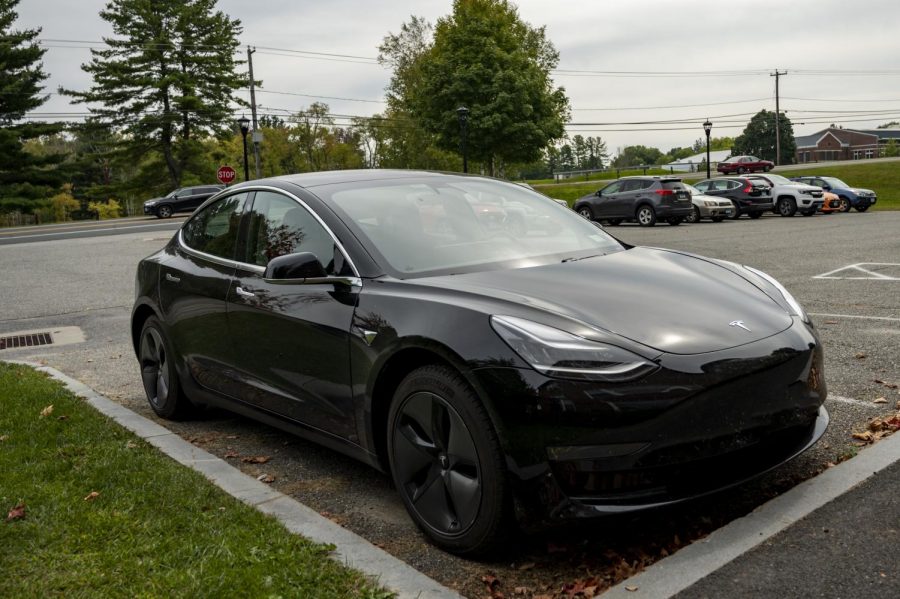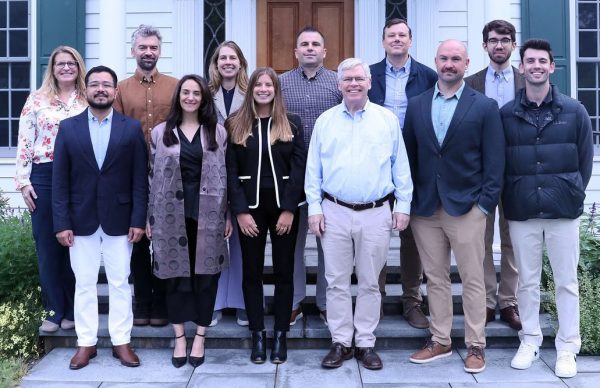Electric Cars on Campus: A Portrait
Mr. Lock’s Tesla electric car.
In recent years, electric cars have increased in popularity among members in the school community. In an effort to promote the use of renewable energy and incentivize faculty to choose electric over Internal Combustion Engine (ICE) vehicles, the school has installed Level 2 charging stations, located near the Mars Athletic Center, Science Building, and various dorms.
Why did you decide to purchase an electric car?
Dr. Thomas Fisher, instructor in history, philosophy & religion (owns a Nissan Leaf): I didn’t intend to. I had to buy a new car, and there was a 2012 Nissan Leaf at the lot for a low price. My daily commute to Hotchkiss is very predictable and short, so I don’t need a car with a really long range.
Mr. Parker Reed, instructor in English and Theater (owns a Tesla Model 3): I felt motivated to do my part for our world. Buying an electric car was a reasonable step to take to alleviate a part of my carbon footprint. I was influenced by faculty members who purchased a Tesla before me, as well as the school’s efforts to reduce its carbon footprint by building an efficient and innovative biomass heating facility.
Mr. David Conti, instructor in classics (owns a Volkswagen eGolf): I bought an electric car about five years ago, because I drive a lot on really short routes to run errands. I realized that it wasn’t actually good for a gas-powered car to only go five miles at a time and an electric car would serve my needs without burning gas.
Mr. Doron Blake, instructor in philosophy & religion (owns a Tesla Model 3): Our family has been very concerned about the environment, climate change, and fossil fuels for our whole lives. When we were looking to replace our old car from ten years ago, an electric car was the obvious choice. We’ve reached a point where the range and efficiency of the electric car is good enough that we’ve never really considered anything else.
What has your experience with your electric car been, especially given the school’s location?
Dr. Fisher: I have an older car with a much more limited range compared to new Teslas, about 60 miles on a full charge, which does make some trips out of town more difficult. My wife has an Internal Combustion Engine (ICE) car, so when we need to make a longer trip, we’ll use her car or go and rent a car.
Mr. Reed: It’s like driving a spaceship. I’ve never encountered such advanced technology in my life and what they have done to create this vehicle is astonishing. Recently, a Level 3 charger has been installed in Canaan and the school has started to invest in Level 2 charging stations. A higher level charge means a faster charging speed.
Mr. Conti: When we first bought our car, there were no charging outlets on campus. We had to find an outdoor plug near Harris House, and it would take all night to charge. When the school installed Level 2 outlets this summer, what used to take 12 hours to charge now takes two to three.
What are the benefits of driving an electric car?
Mr. Reed: I feel that taking money out of the pockets of big oil is a really good idea. While we are putting money into the pockets of billionaires like Elon Musk, his company is trying to do better for the planet. Although natural resources are being used to create battery cells for electric vehicles, it’s better than the current alternative of burning fossil fuels.
Mr. Blake: Our car is three times as efficient as the most fuel-efficient hydrocarbon run car in terms of the raw usage of energy. And as the energy grid gets greener, as we add solar power and wind power, the quality of the energy that the car is running on will get cleaner. The impact of cars will become lower and lower. The maintenance of electric cars is also very inexpensive and simple; it only entails changing the battery fluids every five to eight years.
What are the disadvantages of electric cars?
Mr. Conti: One challenge is range anxiety while driving electric cars – which is fearing that the car does not have enough range to reach a destination or that there are no chargers along the way. It’s an adjustment to learn to plan ahead. The other challenge of electric cars is the difference in range in the summer versus winter months, because atoms in the battery slow down in really cold temperatures. In the summer, I have one-third more range than I do in the cold winter months.
What do you think the future holds for electric cars?
Dr. Fisher: I think we’re going to see a widespread option of electric cars in the next fifteen years. The battery technology is so much better now than it was 15 years ago, and there’s so much interest in electrification. And they’re fun to drive. I didn’t know how much I would love having an electric car when I first bought it, and I’m never going back.
Mr. Conti: Lots of car companies are developing less expensive electric cars and working to become all electric. But for them to be widely accepted, they have to cost less than 40,000 dollars. If battery technology gets cheaper, electric cars will get cheaper. There’s a tipping point where demand and battery price lower the overall cost of electric cars so that everyone can purchase one.
Mr. Blake: Electric cars are the future. We’ve been too slow in addressing our “addiction” to fossil fuels as the technology is becoming more affordable and available. I think all cars will be electric within twenty or thirty years. There might be some complications relating to minerals and materials required to produce such a scale of electric vehicles, but I’m confident that we can figure out a way to recycle and put reusable resources towards new cars.
How can the school continue contributing to a more carbon neutral future?
Mr. Conti: I hope the school considers switching school vehicles that never drive further than nearby towns over to electric cars. The school is already making it easy for faculty to have electric cars by installing charging stations, and there’s no reason to not have an electric car if the daily commute is under 100 miles.
Mr. Blake: In my ten years at Hotchkiss, I’m really proud of the strides that have been made, from improved lighting systems to sustainable food from the farm and solar panels at the Class of 1949 Fields, etc. About a year ago, the administration informed us that they would provide charging stations on campus, and we thought there would just be one. Now, there are half a dozen chargers and the support is fantastic. With the large amounts of rural land we have, I’d like to see more green energy. Anything could be possible, such as solar panels on top of buildings to a big windmill. I feel proud to be a part of this community working towards a carbon neutral future.
Interviews have been lightly edited for clarity.





